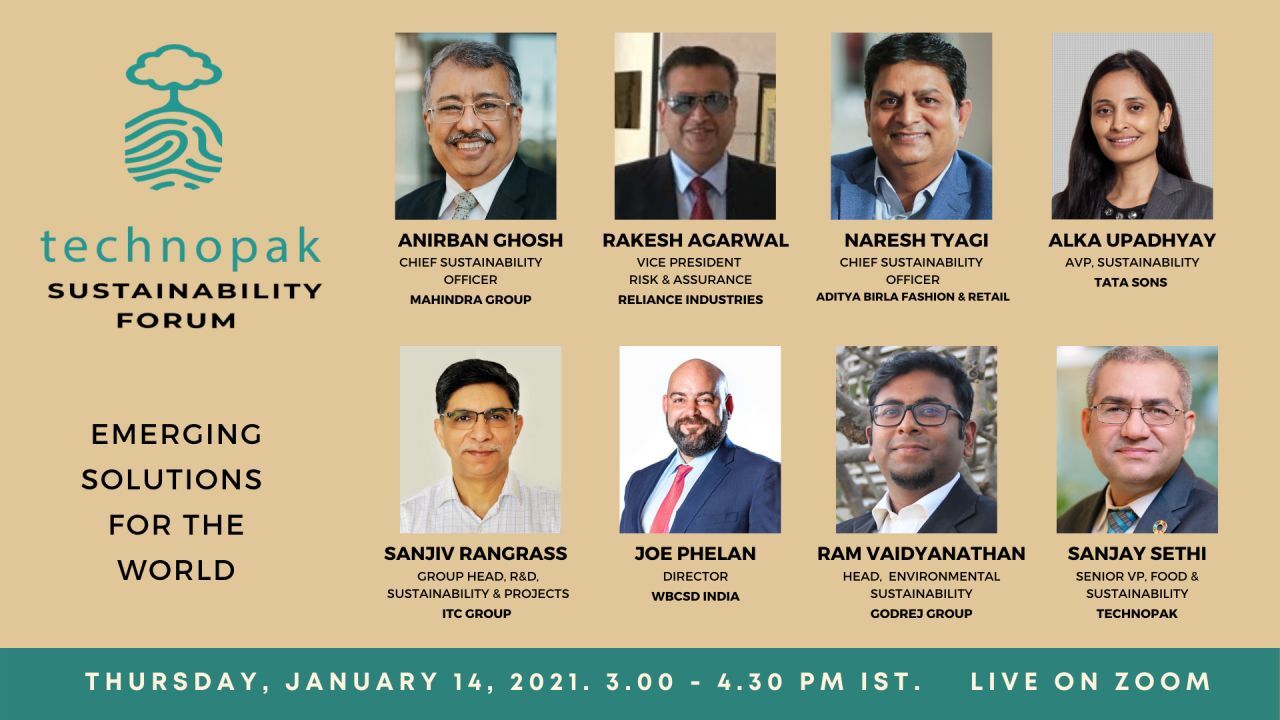Technopak Sustainability Forum discusses steps towards a sustainable future.
The Forum brought together 200 sustainability leaders from the private sector to focus on pressing climate challenges and their solutions through mutual collaboration.
The past year has seen a marked shift in society's attitude toward sustainability. There is an increasing urgency on climate change to limit global warming to 1.5 degrees which necessitate transformations to supply chains. Investors and customers are demanding action, but companies are finding it hard to tackle the future alone.
Technopak Sustainability Forum (TSF) provides actionable insights to scale ongoing initiatives and reimagine solutions drawing on the strengths of leaders in sustainability.
Industrial Dialogue
TSF organized an industry dialogue on the topic on 14th January 2021. They discussed Emerging solutions for the world led by highest-ranking sustainability officers from Tata Group, ITC Group, Mahindra Group, Godrej Group, Reliance Group, Aditya Birla Fashion Retail and World Business Council for Sustainable Development. The Forum brought together 200 sustainability leaders from the private sector to focus on pressing climate challenges and their solutions through mutual collaboration.
"Whatever we may talk, to survive we need to be burning fossil fuels for some more time. A lot of solutions have been talked about but we have to pick up those which do not impact adversely the lives of poor people and those which are right in front of us like natural solutions such as sustainable agriculture, afforestation and preservation of peatlands, mangroves, sea beds, jungles, amongst others. TSF becomes a platform for CSOs to compare their notes with industry peers" said Sanjay Sethi, Senior Vice President, Food and Agriculture, Technopak Advisors.
The leaders opined that there has been a slow uptake of green bonds in India as compared to the western countries or even China. Green bonds and ESG investments are absolutely essential in bringing forth leapfrog technologies to be able to confidently win the climate change battle quickly.
In total 377 companies have committed to being net-zero and a sizeable 50 are from India. Some of those like Mahindra, Godrej, Tata and Reliance were represented on the panel of TSF, encouraging others to commit to science-based targets for climate action. The other panellists ITC had the coveted pioneering role in attaining Platinum certification for water stewardship, Aditya Birla Fashion and Retail bagging most Sustainable company award for gender inclusion and circular business model. The talks also concluded that the government also should bring about policy changes to incentivize resource stewardship by bringing laws like democratizing canal water distribution so that farmers deploy water-efficient technologies like drip irrigation.
Natural climate solutions were discussed as the lowest hanging fruit for capturing the carbon and at a fraction of the cost as compared to other technologies. However, these natural solutions do not get enough attention and budget allocations. Sustainable agriculture, afforestation, and healthy forests are some of these examples of natural solutions.
The sustainability officers attending the meeting benefitted from such interaction amongst the leaders and expressed their solidarity towards Technopak Sustainability Forum to encourage collaboration, partnerships, learning and multi-stakeholder action towards a common goal.
The way forward
Industrial growth is one of the key aspects of a country's development. The Government of India wants to enhance the manufacturing sector's contribution to India's gross domestic product, raising it to a 25 per cent share over the course of a decade and creating 100 million jobs. The risks associated with industrial development include higher pollution levels, overuse of natural resources and increased amounts of waste and wastewater posing a threat to ecosystems. The question facing the sustainability officers is how should we benefit from this development, and also shoulder the responsibility towards the negative consequences of this development. Ecosystem services shed light on the contribution of nature to our well being and how we could include a sophisticated circular model in corporate's sustainability strategy. The Indian Government has made a clear commitment to achieving industrial growth while also protecting the environment. At the same time, the private sector is increasingly interested in adopting modern processing techniques for clean and resource-efficient industrial production.




